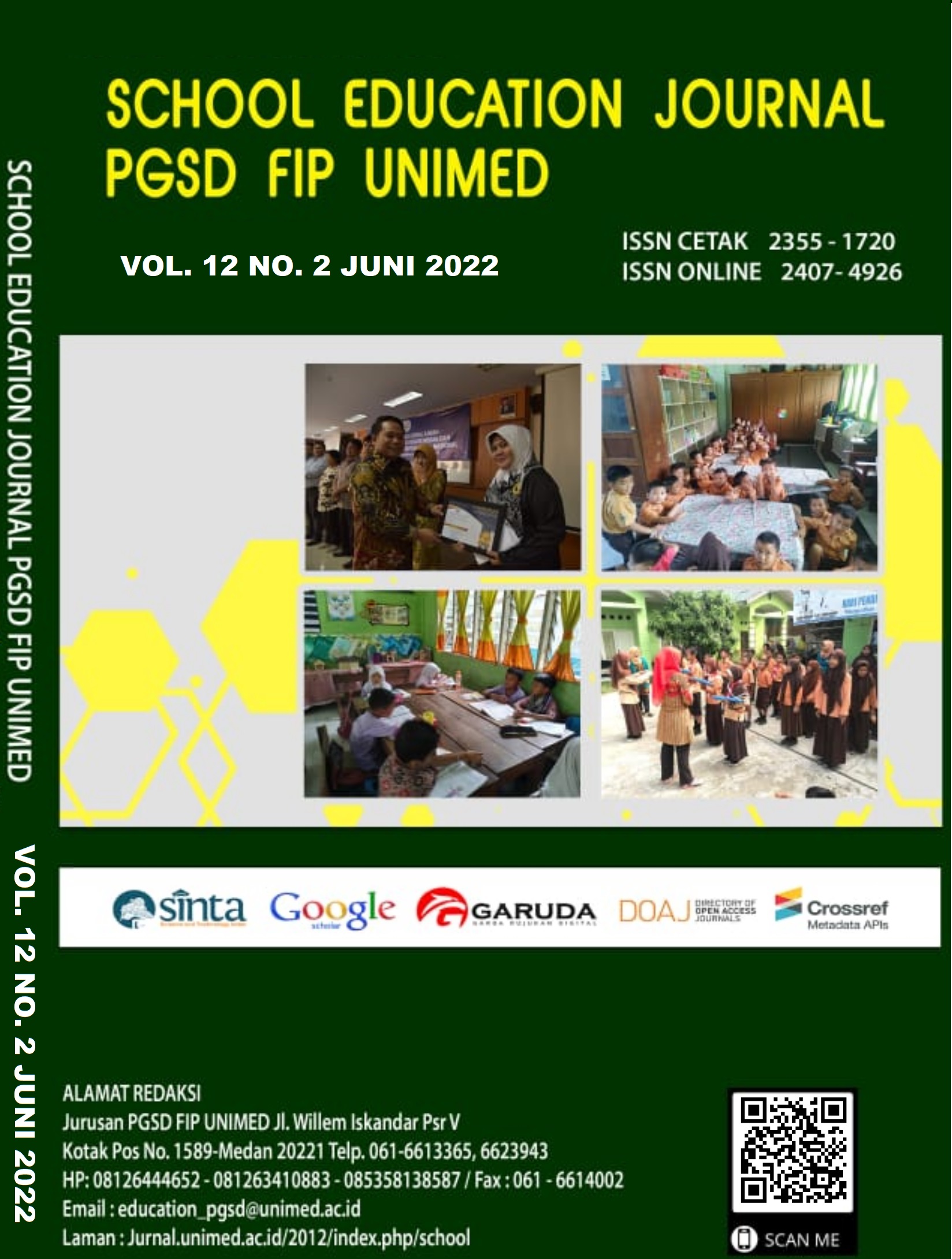THE INFLUENCE OF CHASE METHOD AND TEAM BASE PROJECT-BASED LEARNING MODELS ON LEARNING OUTCOMES IN BASIC PHYSICS AND CHEMISTRY CONCEPTS COURSES PGSD FIP UNIMED STUDENTS
DOI:
https://doi.org/10.24114/sejpgsd.v12i2.35595Keywords:
Chase Method and Team Base Project, Learning Outcomes, Basic concepts of Physics and ChemistryAbstract
This research aims to determine whether there is an influence of the Chase method and Team Base Project-based learning model on learning outcomes in the basic physics and chemistry concepts course of PGSD FIP UNIMED students. The research method used is a quantitative research method with a type of correlation research. The research population is all PGSD FIP UNIMED students in the second semester of the 2021/2022 academic year. The sample taken was 42 students using purposive sampling data collection techniques. The data in this study were obtained through a learning outcomes test. The test results used have been tested for validity and reliability. Meanwhile, the data analysis technique used is correlation. From the calculation results obtained t count is 56.414, then the result is compared with t table at a significance level of 5% which is 2.018. This shows that t count > t table which means that there is an influence of the Chase method and Team Base Project-based learning model on learning outcomes in the basic physics and chemistry concepts course of PGSD FIP UNIMED students. Meanwhile, the use of the Chase method and Team Base Project-based learning model contributed 98.8% to learning outcomes in the basic concepts of physics and chemistry courses of PGSD FIP UNIMED students, while the remaining 1.2% was influenced by other factors.References
Ananda, L.J. Fahrur Rozi, F. Akden Simanihuruk, A. Elvi Mailani, E. 2017. Implementasi Model Pembelajaran Berbasis Masalah (Problem- Based Learning) Dengan Pendekatan Saintifik Untuk Meningkatkan Higher Order Thinking Skills Pada Mahasiswa Prodi Pgsd Fip Unimed. SEJ (School Education Journal), 7(4), 434-443.
Ananda, L.J. & Mailani, E. 2018. Learning Model Based On Problems With Saintific Approach To Improve Students™ Higher Order Thinking Skills. Biodidaktika: Jurnal Biologi dan Pembelajarannya, 13(1), 12-27.
Anggraeni, L. 2012. Penerapan Metode Studi Kasus Dalam UpayaMeningkatkan Kemampuan Berpikir Kritis MahasiswaPada Mata Kuliah Hubungan Internasional. Media Komunikasi FIS, 11(1), 181-195.
Mailani, E. & Humairah, E. 2019. Pengaruh Media Visual Tiga Dimensi Terhadap Hasil Belajar Matematika Siswa Kelas V Sd Negeri 101772 Tanjung Selamat Tahun Ajaran 2018/2019. Seminar Nasional Pendidikan Dasar Universitas Negeri Medan, 1(4), 121-131.
Ratno, S & Elissa, R. A. 2021. Pengaruh Media Sosial Whatsapp terhadap kinerja guru di masa pandemi Covid-19. SEJ(School Education Journal), 11(4) 356-361.
Rosidah, C.T. & Pramulia, P. 2021. Team Based Projectdan Case MethodSebagai Strategi Pengembangan Keterampilan Mengembangkan Pembelajaran Mahasiswa. Jurnal Kajian Pendidikan dan Pengajaran, 7(2), 245-251.
Sugiyono. 2014. Metode Penelitian Pendidikan Pendekatan Kuantitatif, Kualitatif, dan R&D. Bandung: Alfabeta.
Sunardi, & Hasanuddin. 2019. Pengembangan Employability Skill Mahasiswa Vokasi Melalui Pembelajaran Stem-Project Based Learning. SemanTECH, 3(4), 210“21.
Downloads
Published
Issue
Section
License
Authors whose manuscripts are approved are approved as follows:
The publication rights for all journal manuscript materials published/published on the SEJ (School Education Journal) E-Journal site are held by the editorial board with the author's knowledge (moral rights remain with the manuscript authors).
The formal legal requirements for accessing this electronic digital journal article are subject to the terms of the Creative Commons Attribution-ShareAlike (CC BY) license, which means that E-Journal SEJ (School Education Journal) has the right to store, transfer media/format, manage in the form of a database, maintain, and publish articles without asking permission from the author as long as the author's name remains as the copyright owner.
Manuscripts published/published electronically are open access for educational, research, and library purposes.

